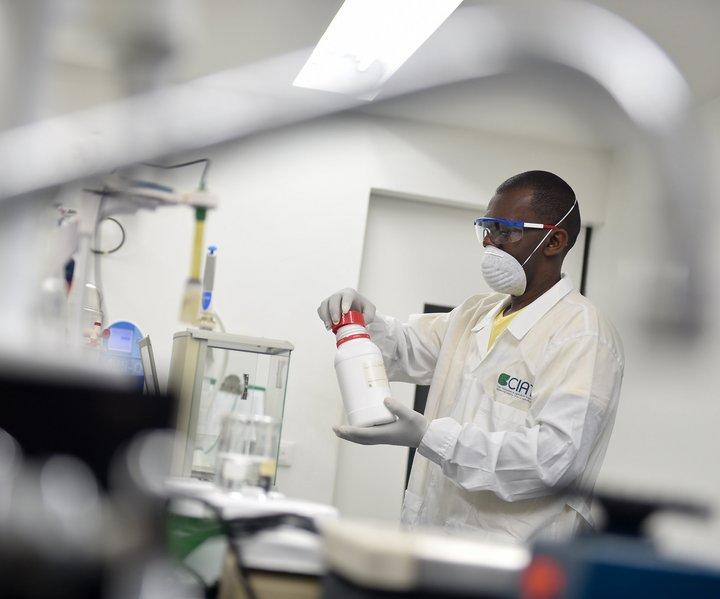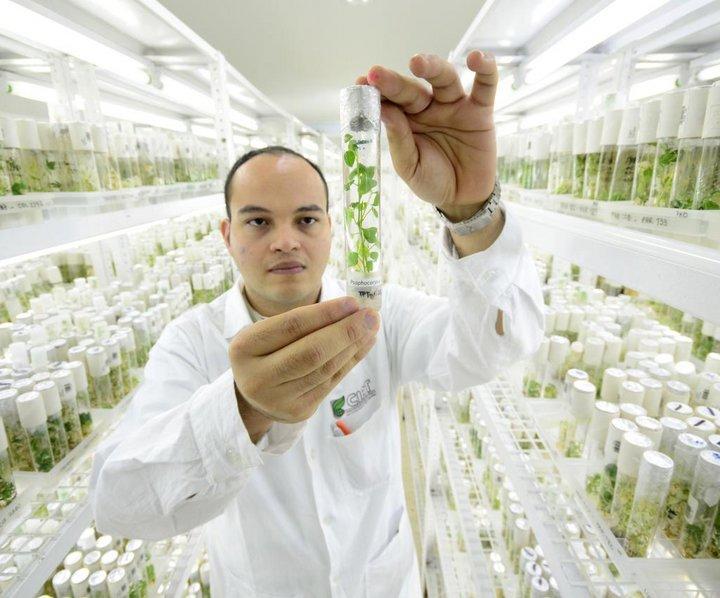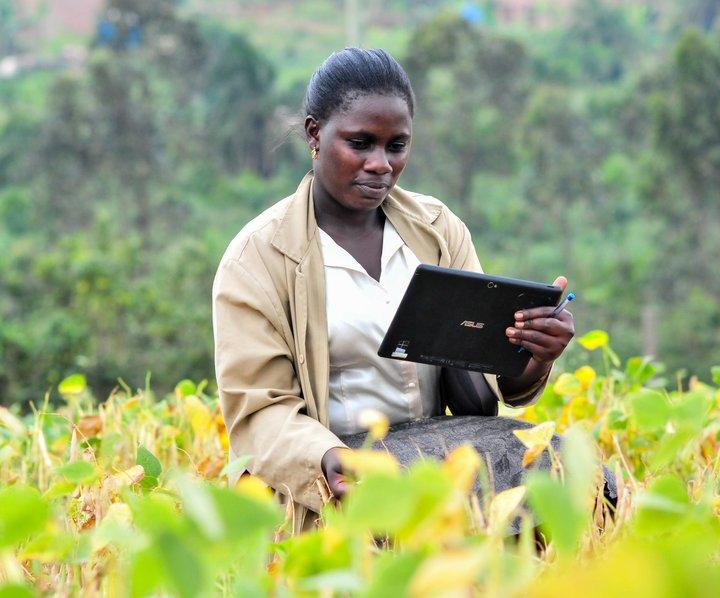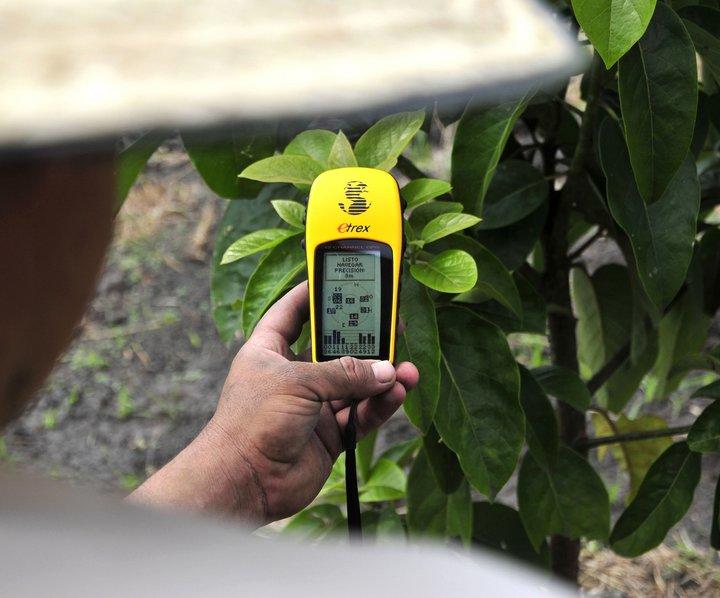Blog The response from the Alliance of Bioversity and CIAT to COVID-19 impacts on global food systems

Researcher working in the Alliance Genebank in Cali, Colombia. The Alliance has quickly mobilized its resources and expertise to respond to the COVID-19 impact on food systems. Credit: CIAT/N.Palmer
Efforts to curtail the COVID-19 pandemic have sent shockwaves across the globe. The immediate measures to preserve human life and bring the health crisis under control have been wholly necessary, but as restrictions on “normal” modern life remain in place for months to come, disruptions to food systems will inevitably become more acute. For the world’s most vulnerable, this is not good news. The number of hungry people, already at 800 million, could double as part of the wider fallout from the pandemic.
As a global organization working at the nexus of agriculture, the environment, and nutrition, the Alliance of Bioversity International and CIAT is in a position to help countries avert further catastrophic hits on their food systems by stress-testing promising quick-response options, monitoring and mitigating current impacts, improving and accelerating responses, and facilitating recovery.

Samples of cassava conserved in vitro at the Alliance Genebank in Cali, Colombia. Our scientists are working to help countries meet food security requirements, safeguarding our global collection of seeds and germplasm. Credit: CIAT/N.Palmer
Immediate action
The Alliance has quickly mobilized its resources and expertise to address immediate needs, including helping our host countries meet short-term food security requirements, providing real-time information on COVID-19-driven shifts in food consumer behavior, and continued safeguarding of our global collections of seeds and germplasm, assuring that suitable and improved materials are ready for deployment to farmers fields across the globe.
Food security – by mid-April, the Alliance donated more than 4.5 tons of improved, biofortified varieties of beans, rice and maize to 25 municipalities across Colombia – enough to ensure that 4,500 low-income farming families have access to nutritious food and generate some revenue for the next 12 months. Some of this seed is foundation seed, meaning that harvested seeds may be used to plant more fields and assist in longer-term food security.
We are working with local authorities to donate more seed.
Consumer demand – In Vietnam, the Alliance’s free Wi-Fi service for food markets has helped us observe and understand consumer behavior in real-time, before, during and after the crisis. Paired with digital survey information of vendors in the markets, we can monitor and potentially predict consumer behavior in traditional food markets across Asia.
Safeguarding seeds – The Alliance’s genebanks in Colombia and Belgium have stayed operational during the lockdown. Home to the largest collections of varieties of beans, bananas, forages, and cassava in the world, these resources are essential for research and are available to farmers who are vulnerable to crop losses, food insecurity and lost income.

Field technician in the Alliance research station of Kawanda, Uganda. Country-level food system support is key to developing evidence-based proposals so partners, funders, investors and policymakers can address the impacts of COVID-19. Credit: CIAT/G.Smith
By drawing on decades of experience from working at global and local scales, our scientists believe that the Alliance’s COVID-19 responses need to focus on supporting food systems at the country level, at least in the short- to medium-term.
Continued trade disruption, food price volatility, and border closures mean that people – especially in countries already affected by climate change, land degradation, migration, and poverty – will likely suffer from food shortages and lack of access to nutritious food.
While we remain committed to our ongoing research agenda, country-level food system support will be key to developing robust and evidence-based proposals so partners, funders, investors and policymakers can address the impacts of COVID-19 on food systems. Our work complements a series of COVID-19 related initiatives by other members of the CGIAR, the world’s largest global agricultural innovation network.

Alliance’s GPS device to collect, process and aggregate information on to support planting decisions. Our researchers have already mobilized data-gathering resources to learn how COVID-19 is influencing agricultural production. Credit: CIAT/N.Palmer
We have divided this response into three main areas:
First, we will monitor impact. Our researchers have already mobilized data-gathering resources to learn how COVID-19 is influencing agricultural production and consumer behavior. This work will allow us to evaluate the extent to which country-level food systems have been disrupted by the pandemic.
Second, we will improve and accelerate responses. In the short- to medium-term, our impact monitoring will lead to the deployment of targeted policy recommendations and proposals to keep national food system supply chains open and thriving, even under conditions of global stress.
Third, we will facilitate recovery. Over the longer term, we will embed resilience in national food systems through evidence-based policy and action recommendations. We will do this by helping countries shift consumer and agricultural behavior toward increased domestic food production, improved diets, and improved resilience to future external shocks.
“Rigorous research on COVID-19’s impact on food systems will be essential to helping us withstand this global crisis, accelerating recovery once the crisis ends, and building food systems of the future that perform better in addressing the nexus of agriculture, nutrition and the environment” said Juan Lucas Restrepo, the Director General of the Alliance. “Our global team of scientists and collaborators will make substantial progress on making the globe more resilient to future shocks.”
